Last updated
Jul 30, 2024
Did you know that over 810 million websites worldwide relied on WordPress in 2024?
It’s no surprise, really. The open-source CMS provides business owners of any size with an agile, cost-effective way to create a functional website in as little as five days.
Now, imagine you could streamline your WordPress site management and enhance user experiences even further.
For 48% of small businesses that adopted AI in 2023, this vision is already a reality. And for 2025, For 2025, adopting AI isn't just innovative; it's essential. Businesses leveraging AI are reporting an average 20% boost in organic search traffic and a 19% revenue increase.
In fact, according to a recent SBEC survey, 93% of small business owners agree that AI tools offer an affordable way to boost savings and profitability.
And with 60,000+ plugins available in the WordPress directory, the potential for integrating AI techniques to improve your WordPress site is boundless.
Read on to learn how to make the most of it!
What can AI do for your WordPress site?
Integrating AI into your WordPress site empowers you to optimize performance, visibility, and conversion and opportunities. With deep learning, natural language processing (NLP), reinforcement learning, predictive analytics, and behavioral analysis available as third-party AIO tools, you can deliver a more personalized, efficient, and engaging experience for your visitors.
And why does user experience matter so much? Because 89% of users would choose your competitor after a bad user experience.
Other notable benefits you could leverage include:
Faster website creation with AI-generated content like copies, images, videos, audio, and FAQs that resonate with your audience.
Improved site performance and security with AI-driven optimizations and scheduled maintenance for an uninterrupted, safe browsing experience.
Enhanced search engine rankings with advanced algorithms that analyze trends and user intent for improved website visibility and more organic traffic.
Actionable insights and trends extracted from large amounts of data so you can drive business growth in the best moments.
Increased sales with ecommerce inventory optimization, better and smarter lead gen tools and more.
For reference, here’s how businesses in 2024 chose to use AI.
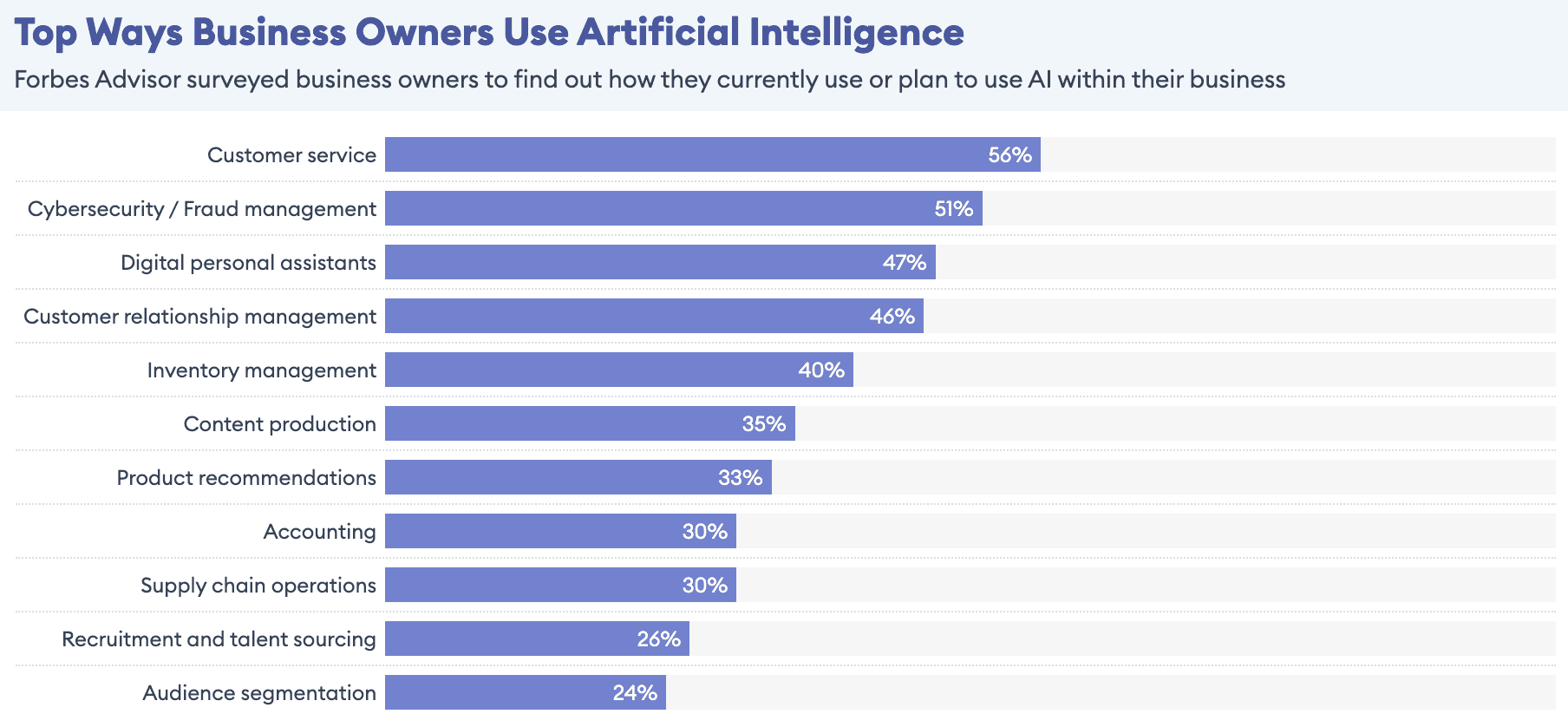
How does this relate to the WordPress ecosystem, though?
WordPress and AI: An ongoing discussion
As an open-source platform, WordPress is known to seek the opinion of the community regarding new developments and the overall roadmap.
In a thread from May 2023, the core WordPress team and contributors exchanged opinions about the role of AI in the CMS.
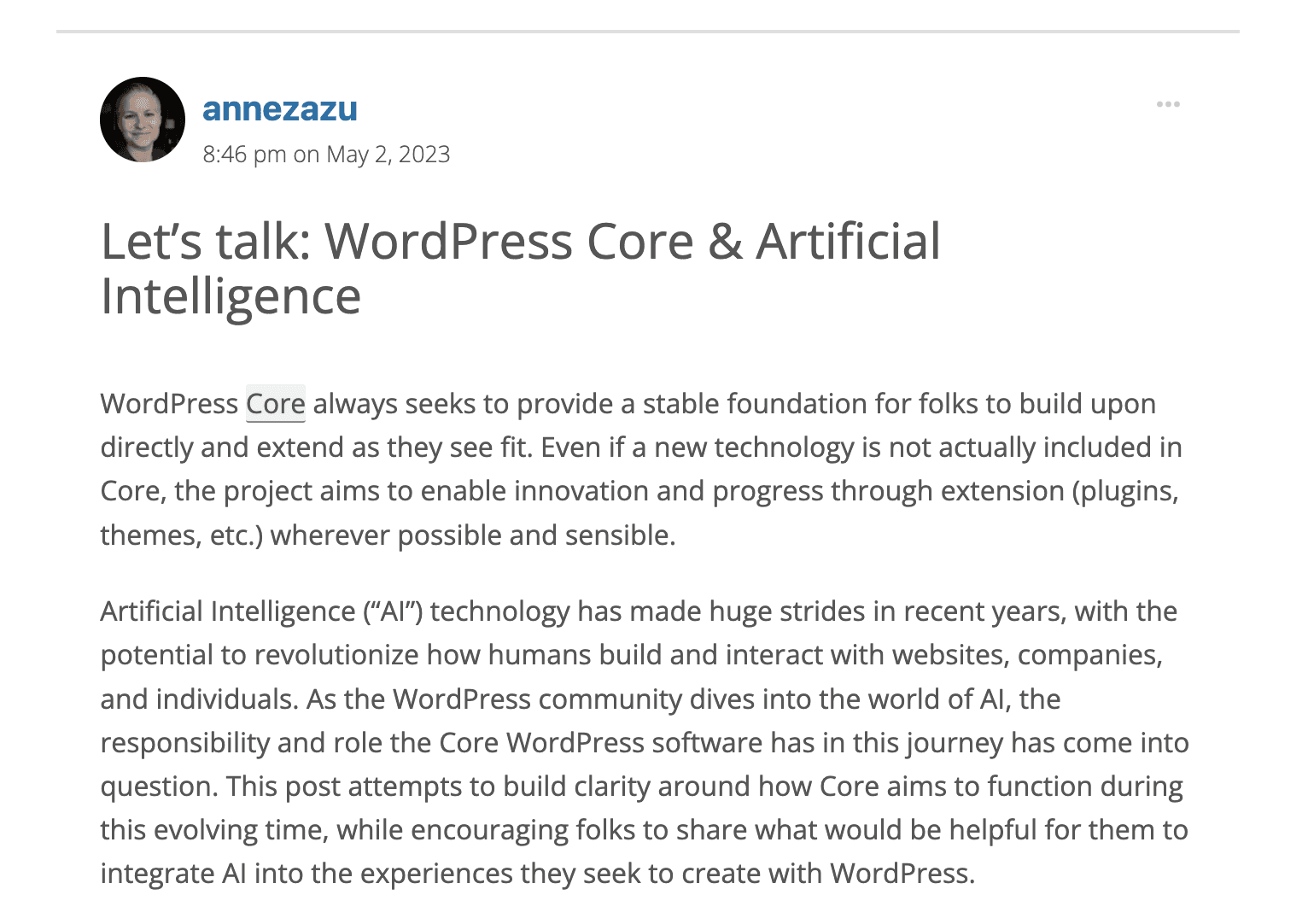
Following the discussion, several highlights come through:
AI belongs in the plugin territory: Since AI options currently require integration with third-party systems and pricing, AI adoption is more likely to be carried out by the plugin ecosystem rather than Core. At least until AI models become fast enough to run on the same server.
DX (Developer Experience) as the next place for innovation: Several members comment on current DX shortcomings in the block editor and call for a focus on extensibility that might allow plugins to experiment more freely with AI integrations.
AI for collaboration: Others suggest integrating AI for collaboration and better workflow. For example, AI chatbots could be included as “just another” user type in WordPress's Phase 3. A more bold vision is to introduce a personal AI assistant for businesses inside the admin panel.
Even though the discussion of AI in WordPress is not closed, the team’s roadmap clearly shows that artificial intelligence doesn’t (yet) have as high a priority as the action points already in motion.
However, it is worth noting that:
In June 2023, WordPress integrated Jetpack AI assistant into the editor as a block to enable customizable content creation;
Later on, in partnership with OpenAI, WordPress also introduced two new blocks: AI Paragraph and AI Image to empower auto-completing posts and prompt-based image creation.
Further, in 2024
There are already a myriad of AI plugins available for WordPress site owners.
In 2024, Automattic, the company behind WordPress, made a bold move toward an AI-driven future by acquiring WPAI. This acquisition brought cutting-edge tools like CodeWP, AgentWP, and WP Chat into the WordPress ecosystem, enhancing both user and developer experiences. Staying true to its open-source roots, WordPress has demonstrated a clear commitment to leveraging AI, marking an exciting milestone in its evolution and paving the way for future innovation.
Another exciting innovation (although not AI-related) is the introduction of the Speculative Loading plugin. It's based on Google's Speculation Rules API and allows site owners to request the browser to preload key pages that are highly likely to be visited by a user next.
In other words, predictive page preloading for future navigations that makes site browsing much faster, if not near instantaneous. Pretty exciting, right?
For now, while AI integration into WordPress Core is still developing, site owners can explore five powerful AI strategies to enhance their WordPress websites.
7 AI strategies you can use for your WordPress site
In WordPress, AI strategies refer to different ways of adopting artificial intelligence into your workflow and daily business processes.
Strategy #1: Automated web design and layout creation
When starting a new business project, speed to market is critical.
In WordPress, customizing themes often consumes time and resources, with challenges like design iterations, bug fixes, and compatibility issues delaying progress.
AI-powered website builders like Elementor AI and Divi AI revolutionize this process by leveraging natural language processing (NLP) to interpret user inputs and automatically create tailored websites. These tools analyze user requirements, suggest suitable design elements, and populate pages with relevant content, making website creation faster and more intuitive.
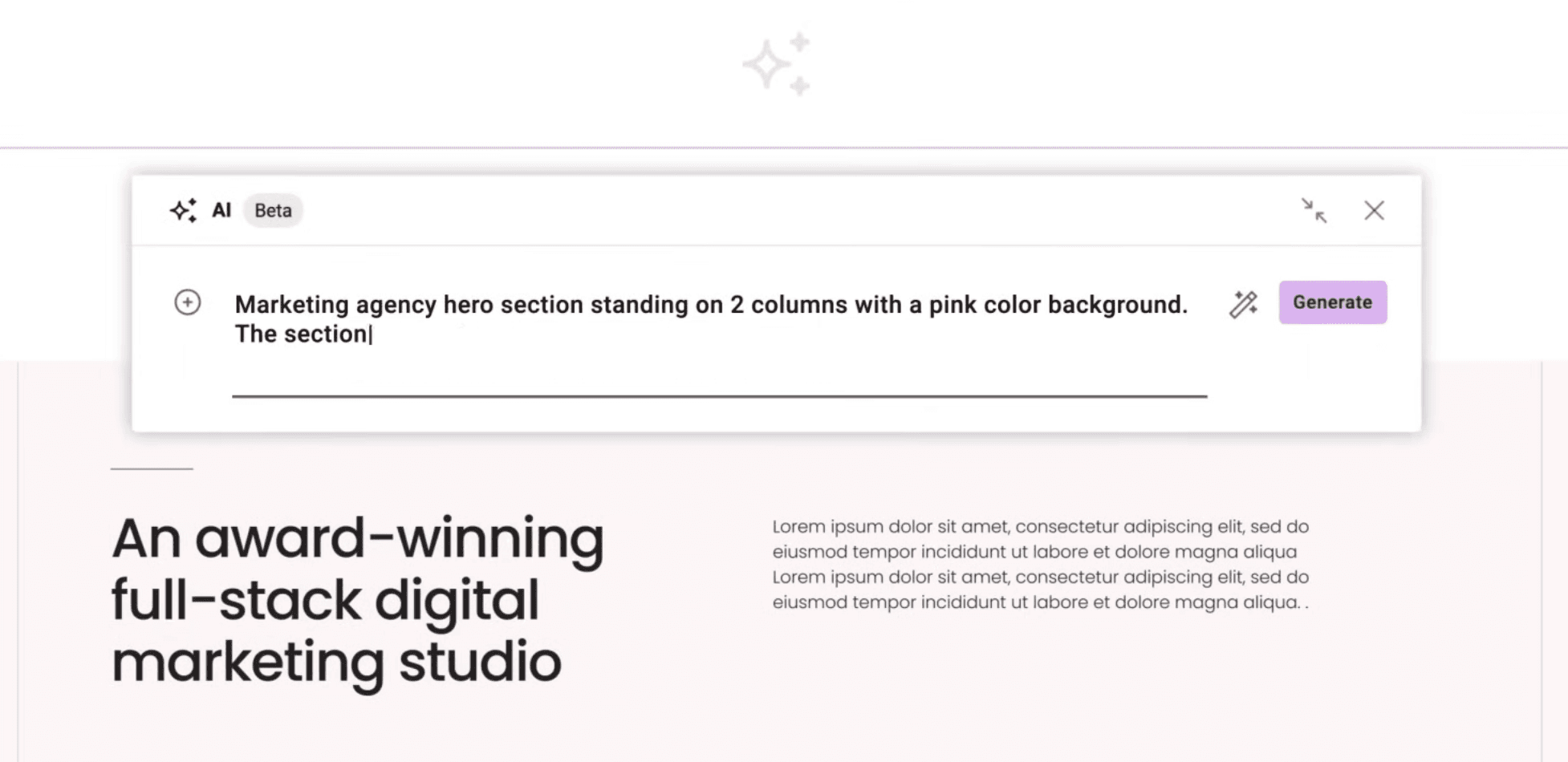
With AI, you could build a website from the ground up in days:
Container layouts
Unique images generation
Relevant copy tailored to your audience
Custom code and more…
In 2025, AI tools bring enhanced features to the table:
Adaptive design capabilities: Elementor AI now offers dynamic, mobile-first layouts that adjust seamlessly to user behavior and preferences.
Advanced content generation: Divi AI includes improved contextual understanding, generating custom text, images, and even CSS code to match your website's needs.
Accessibility enhancements: Tools like Bertha AI integrate automated alt text generation and ARIA labels to ensure compliance with accessibility standards.
SEO Integration: AI builders now auto-generate schema, meta descriptions, and keyword-rich content, ensuring your site is search-engine optimized from day one.
While AI-generated websites may require expert polishing, this technology saves significant time, allowing developers and designers to focus on perfecting the finer details.
Strategy #2: Faster content generation
Content creation platforms now leverage advanced NLP models, including GPT-4 and emerging AI technologies, to analyze user prompts and generate highly engaging, human-like text.
Content teams, bloggers, and site owners can use these to flesh out new content for:
Blog articles
Product descriptions in bulk
Social media posts
Support articles and more.
Tools like Bertha AI and Copymatic now include enhanced features, such as multilingual support, AI-driven tone adjustment, and advanced content templates. These innovations ensure you can maintain a dynamic content calendar and keep your audience engaged throughout the year.
In 2025, AI-powered content generation tools have significantly advanced, offering enhanced features to streamline your content creation process. Enhanced natural language processing ensures better tone matching and accuracy, while new features like multilingual support and built-in SEO optimization streamline the process for content creators. These improvements allow teams to produce engaging content faster and stay ahead in a competitive digital landscape.
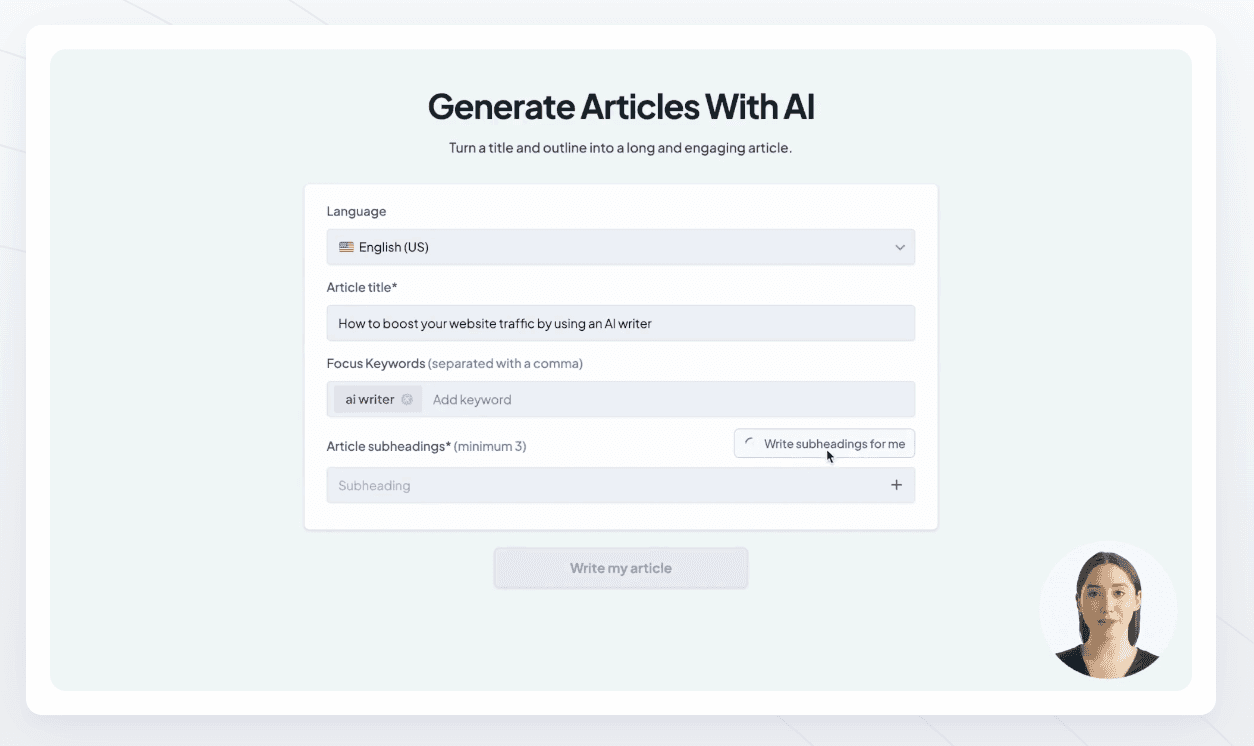
Strategy #3: Instant Page Loading and Responsiveness
With users abandoning websites if they don’t load before 2.75s, WordPress site owners have a small window to make a good impression. While traditional optimization tools focus on compressing assets or optimizing code, there are very few AI-driven solutions designed to enhance speed.
You can now leverage the power of AI to speed up your site with Navigation AI by Uxify. The tool allows you to preload entire web pages before users click on them, resulting in near-instantaneous loading times. Navigation AI builds on your existing optimization setup and works seamlessly on top of all caching plugins, requiring minimal effort to integrate.
For WordPress site owners seeking a competitive edge, Navigation AI is the go-to solution for AI-powered speed optimization.
Strategy #4: Dynamic User Engagement
After your visitors land on your website, you want to answer all their questions as quickly as possible.
Conversational AI is at the forefront of great user experiences, and introducing a chatbot to your WordPress site will not only help you provide visitors with tailored information but also increase engagement, satisfaction, and conversions.
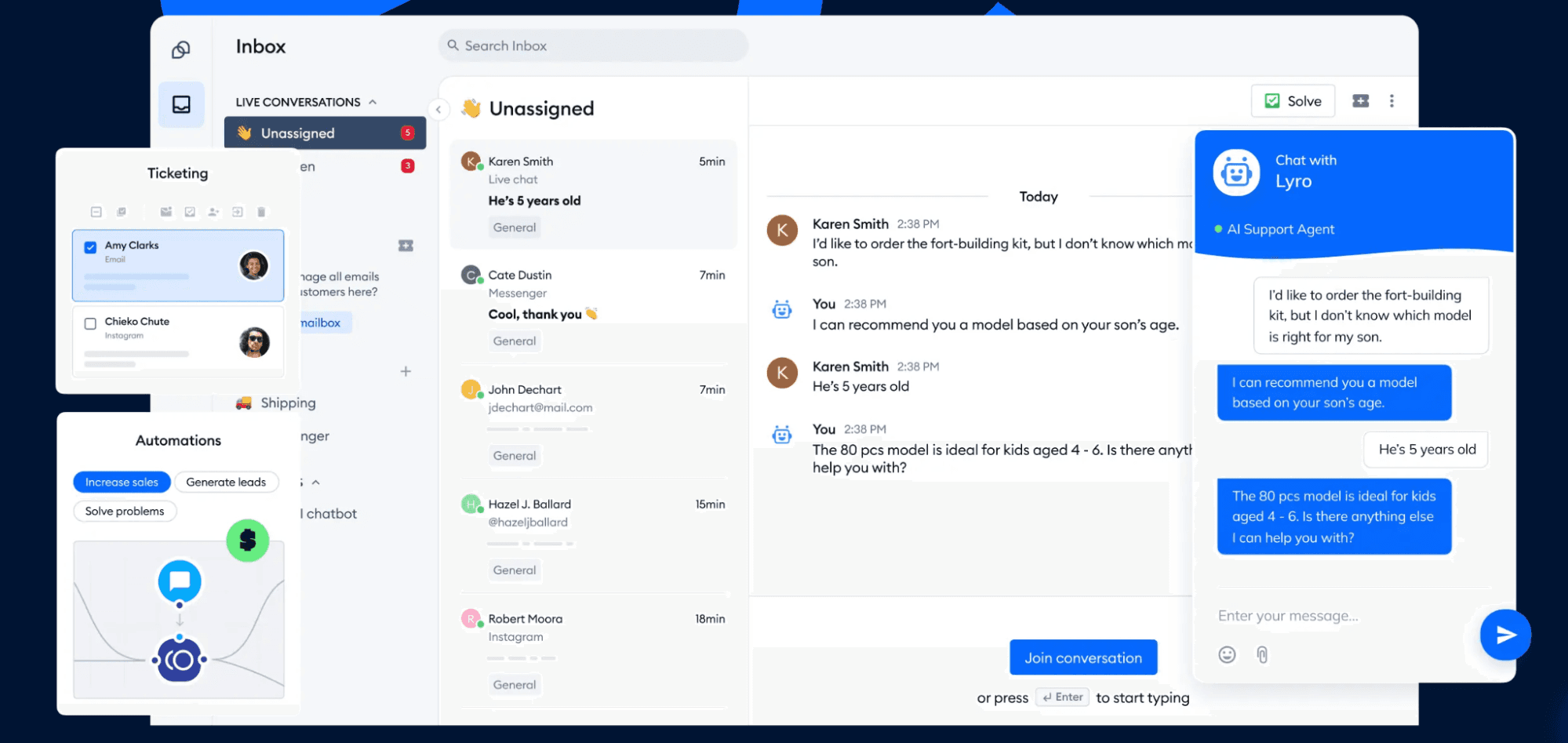
With chatbots like Writesonic and Tidio, you can:
Welcome customers with custom greetings and personas
Handle customer inquiries 24/7
Guide users through your site
Display relevant questions and answers dynamically
Gather contacts to streamline tickets
And even schedule appointments.
Trends Driving Conversational AI Adoption in 2025
Focus on accessibility: Many AI tools now prioritize compliance with accessibility standards, offering features like voice input and screen reader compatibility.
AI in ecommerce: Chatbots are playing a central role in e-commerce, from guiding users to relevant products to upselling through personalized recommendations.
Automation and workflow integration: AI is increasingly integrated with CRM tools and marketing platforms, creating seamless workflows that boost efficiency.
By adopting conversational AI trends in 2025, WordPress site owners can create engaging, efficient, and tailored user experiences, ensuring their websites remain competitive in a fast-paced online environment.
Strategy #5: Search Engine Optimization (SEO)
Ranking higher in search engines guarantees more first-time visitors and new potential customers.
Traditionally, SEO requires a lot of manual work and daily tweaking to get you the best results. With AI, you can improve your site’s visibility by following recommendations based on keyword analysis, content scoring, and metadata optimization.
AI tools in 2025 simplify SEO with smarter features like real-time optimization suggestions, helping you apply best practices while creating content. They also adapt to new trends like voice and video search, ensuring your site stays ahead in a rapidly changing landscape.
Other improvements include dynamic schema generation and localized optimization, enabling better search visibility and a broader reach. AI-driven competitor analysis now offers insights into keyword gaps and SERP opportunities, giving you an edge in crafting targeted content.
By integrating predictive analytics, AI tools can analyze trends and anticipate search behaviors, allowing you to align your content with future search intent effectively.
With tools like Rank Math SEO and AIOSEO, WordPress users can leverage advanced SEO insights and automations to stay competitive in 2025.
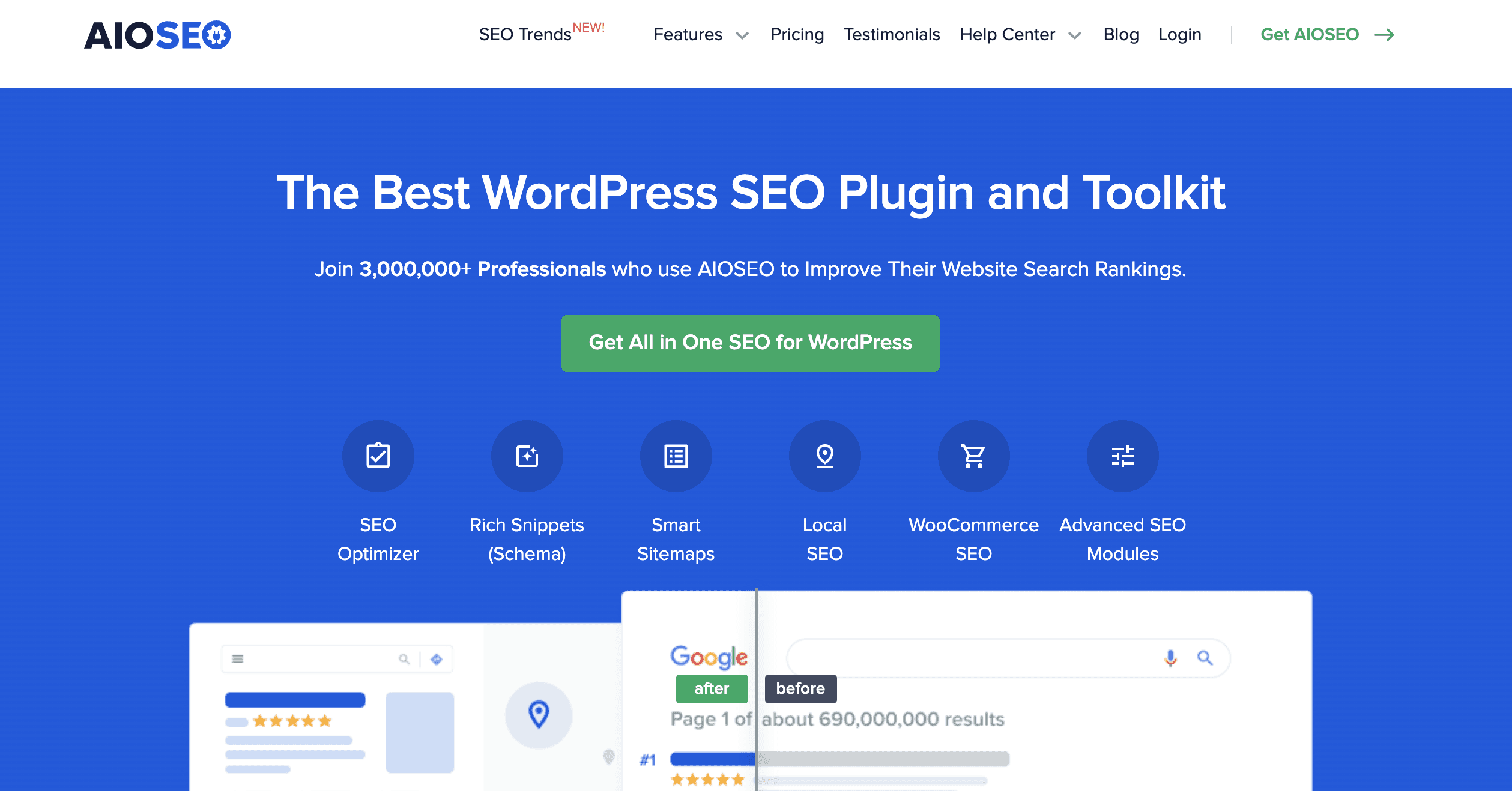
Strategy #6: Automated website security and maintenance
With 56% of WordPress vulnerabilities stemming from plugins, securing your site has never been more critical. In 2025, AI-powered tools are taking website security to the next level with smarter, faster, and more reliable solutions.
AI now uses advanced threat detection algorithms to identify and mitigate risks in real time, minimizing downtime and safeguarding sensitive data. Tools also offer automated updates and proactive maintenance, ensuring your plugins and themes stay patched against vulnerabilities without manual intervention.
Additionally, pattern recognition techniques help spot unusual activity, while false-positive detectors reduce unnecessary alerts, streamlining the security process. AI-driven dashboards now provide actionable insights, empowering site owners to monitor and manage security with ease.
By adopting tools like Quttera Web Malware Scanner or Wordfence AI, WordPress site owners can ensure robust protection against cyber threats, keeping their sites running smoothly and securely in 2025.
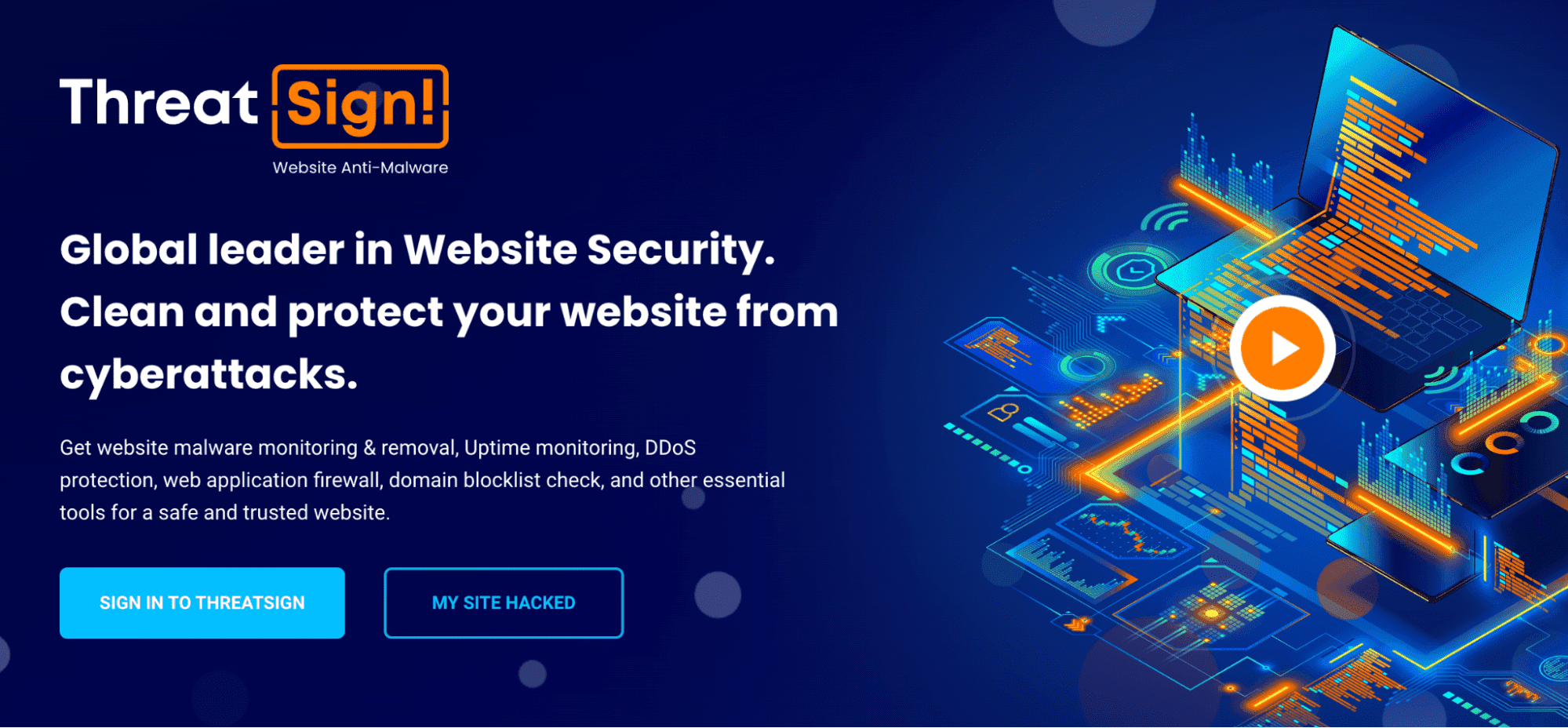
Strategy #7: Improved lead generation
Companies leveraging AI for lead generation see a 50% increase in leads and a 47% higher conversion rate. In 2025, AI-powered tools offer even more sophisticated methods to identify, nurture, and convert prospects.
Manual prospecting and cold calling take up too much time from your sales team, and leads are often not properly scored.
With AI, WordPress tools can analyze customer behaviors, preferences, and past interactions to pinpoint the perfect prospects for your business. Thanks to rule-based logic, you can choose to nudge prospects on key pages (e.g., pricing page) with:
Personalized messages
Offers
Pop-ups
Targeted notifications and more.
Additionally, tools like Link Whisper and Altis Accelerate can help you improve internal link-building and A/B testing processes to ensure your visitors are served with the most relevant content at any moment.
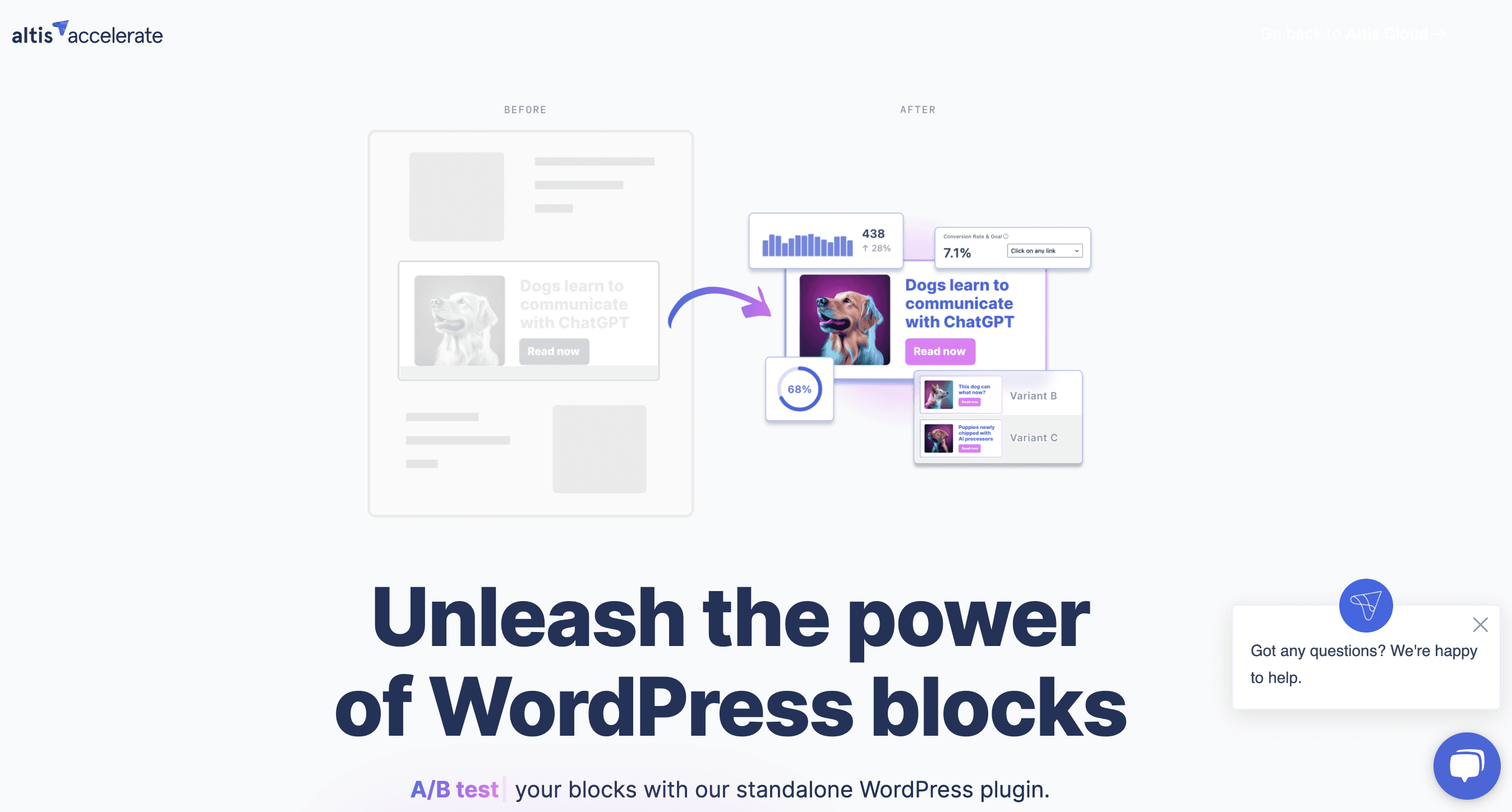
Getting Started with AI on Your WordPress Site
Introducing AI to your WordPress website doesn’t have to be complicated. For now, WordPress plugins are the fastest way to start leveraging AI to improve your site.
Generally, you’ll need to follow the same principles as if you were choosing a new plugin to add to your setup.
Here is a quick checklist to follow:
❓ Are the reviews and ratings positive? What’s the latest negative review?
❓ How many active installations does the plugin have? Is it popular and reliable?
❓ Is it supported regularly, and when was it last updated;
❓ Are the AI features part of a plan or come as an add-on; do they fit your budget;
❓ Is everything compatible with your existing tech stack and the latest WordPress version;
❓ Is the plugin certified for security, and does the developer behind it look reputable?
That said, most solutions offer limited free plans or trial periods to test new features, so make sure you reach out to their teams and do a test drive before you commit.
Final Thoughts
Adopting AI for your WordPress site in 2025 isn’t just about keeping up, it’s about staying ahead. From faster page loading and smarter content generation to advanced SEO and enhanced user engagement, AI tools empower site owners to create a more dynamic, efficient, and impactful online presence.
By integrating these AI strategies, you can enhance every aspect of your website, from design and performance to security and lead generation. Whether you’re a small business owner or managing multiple sites, the potential of AI for WordPress is limitless.
Explore our AI Trends section to stay updated on the latest innovations, breakthroughs, and practical applications in web performance and beyond.
UX Content Strategist
Table of contents
No headings found on page

